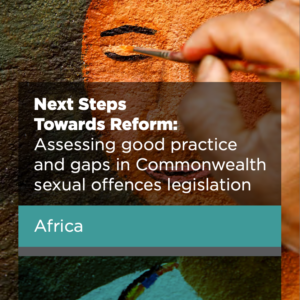Namibia’s sexual offences laws are in the Combating of Rape Act 2000 (CRA), the Combating of Immoral Purposes Act 1980 (IPA) and the Children Care and Protection Act 2015 (CCPA). The Criminal Procedure Act 2004 (CPA) contains the rules relevant to evidence in sexual offences cases. Namibia does not have a penal or criminal code, as the criminal law is uncodified. Some sexual offences are common law offences, including the offence of sodomy.
Some of the provisions covered by this review and the criteria below meet good practice standards. For example, the CRA contains a comprehensive gender-neutral definition of rape including all forms of non-consensual sexual penetration – by penis, objects and other body parts – of all orifices. However, coercion is required unless the complainant is incapacitated, which is not good practice. Marital rape is explicitly criminalised. The CPA expressly states that corroboration is not required for any offence and that the prior sexual history of a sexual assault complainant is inadmissible.
However, not all non-consensual physical sexual acts are criminalised. The common law offence of indecent assault is limited to physically touching the genitals or other private parts of another person’s body. Further, there is only one child sexual assault offence in the IPA – ‘carnal knowledge of a child under 16’. The CCPA includes only limited offences related to sexual acts, for example, exploitation of children for the creation of pornography. Child pornography offences are not assessed in this report. The IPA also criminalises sexual intercourse with a woman who has an intellectual disability, regardless of her capacity to freely and voluntarily consent. It also uses the derogatory terms ‘imbecile’ and ‘idiot’.
In Namibia, sodomy and the crime of ‘unnatural sexual offences’, which includes other forms of sexual activity between men, are criminal offences under the common law inherited from South African (and formerly British and German) rule. Criminalising same-sex sexual activity has been held in court decisions in other Commonwealth jurisdictions, such as Belize, Botswana, India and Trinidad and Tobago, to be unconstitutional. The common law offence of ‘indecent assault’ has been applied by the courts in Namibia to non-consensual heterosexual and homosexual anal intercourse. However, laws that criminalise consensual same- sex sexual activity should be repealed and all non-consensual sexual acts, including anal ‘rape’, should be included in the general sexual assault provisions, such as ‘rape’ and ‘sexual assault’, as well as in child sexual offences. All of these crimes should be gender-neutral.
Namibia is a state party to relevant international and regional human rights treaties, including the Convention on the Elimination of All Forms of Discrimination against Women, Convention on the Rights of the Child, Convention on the Rights of Persons with Disabilities, Convention against Torture and Other Cruel, Inhuman or Degrading Treatment or Punishment and International Covenant on Civil and Political Rights. Namibia is also a party to the African Charter on Human and Peoples’ Rights and the African Charter on Human and Peoples’ Rights on the Rights of Women in Africa (Maputo Protocol).
Read more about the criminalisation of LGBT people in Namibia.
The full assessment of Namibia is also available here.



